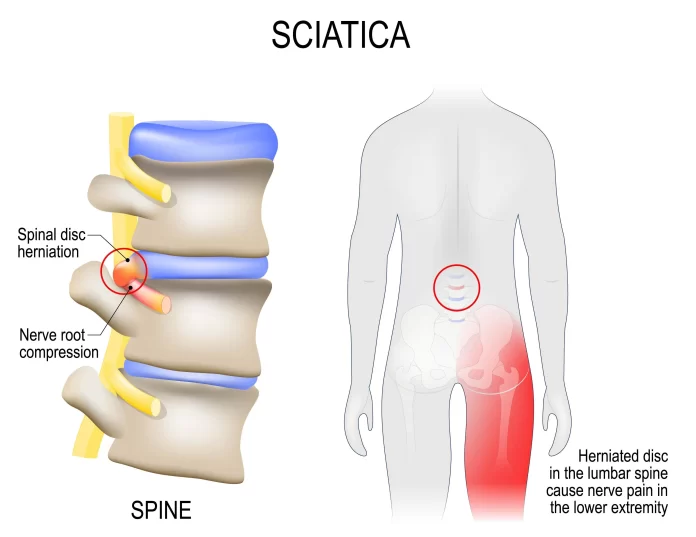Estimated reading time: 0 minutes
Sciatica is a collection of symptoms including pain, tingling, numbness, and weakness along the sciatic nerve, which travels from the lower back to the feet.
Lumbar radiculopathy is the medical term for sciatica, a disorder in which inflamed or compressed spinal nerve roots in the lower back cause pain and/or neurological symptoms in the lower extremities.
You may be surprised to discover that a herniated disc in the lumbar spine is one of the most frequent causes of sciatica. Continue reading to learn more about how a herniated lumbar disc can cause leg and foot paralysis and burning pain.
Herniated discs may irritate the sciatic nerve’s origins.
Your lower back (lumbar spine) carries a significant amount of weight and is in constant motion, making your spinal discs susceptible to injury and pain. A disc injury may cause the interior soft core (nucleus pulposus) to migrate and press against the outer fibrous layers (annulus fibrosus). The flexible substance could also escape by tearing apart the fibrous rings.
Discs are typically in close proximity to the spinal cord and spinal nerve roots (the portion of a spinal nerve that exits the spinal cord).
Multiple nerve roots, including the sciatic nerve, can be compromised by a herniated disc. Each lumbar nerve root is responsible for transmitting pain to a specific leg region.
When a disc herniates, it can cause inflammation by leaking chemical compounds into one or more sciatic nerve roots.
There is direct mechanical compression of the nerve root.
From the damaged nerve root, sciatica pain and neurological symptoms such as numbness, tingling, and/or weakness extend into the leg and foot.
Follow these four suggestions if you have a herniated disc to avoid sciatica.
Everyday activities such as bending, lifting, twisting, and protracted sitting can result in disc herniation. You will be able to avoid a new disc herniation and/or recurring irritation of your sciatic nerve roots caused by a previously herniated disc by modifying your poor habits and adopting new practises.
Protect your discs after extended periods of sitting or bending.
Long periods of sitting or bending can increase the pressure on your discs by nearly 40 percent, making them more susceptible to injury. After prolonged seating or bending, lifting and/or high-energy work should be avoided. Moving a bag of dirt after a long period of bending and weeding, for instance, or moving heavy bags after a long drive or flight are also poor ideas.
Allow your discs a few minutes to recover and realign before engaging in rapid or strenuous movement.
2.when bending, maintain a healthy lumbar arch.
When doing housekeeping, lifting something off the floor, working, or sitting, we frequently flex our spines. Maintaining a secure lumbar arch while performing these activities will help prevent or aggravate disc herniation by reducing disc stress.
Ensure a stable lumbar arch while stooping by:
stooping the knees to retrieve something from the ground
While bending forward, pivot from the pelvis, not the spine.
Golfer’s lifting procedure for lifting small objects
Pushing a heavy object rather than lifting it.
Rest one leg on a footrest if you must stand for an extended period of time, such as when doing the dishes.
Having the shoulders rolled back and the vertebrae in its natural alignment when seated.
Also, when bending, standing, walking, or sitting, make an effort to avoid stooping, hunching, and slouching.
Utilise assistive devices to alleviate disc pressure.
You can alleviate pressure on your vertebrae by using assistive equipment such as:
Ideally, your luggage should have four wheels, not two.
Baskets instead of shopping or laundry trolleys
While sleeping, place pillows between your thighs (if you sleep on your side) or beneath your knees (if you sleep on your back).
You may be able to protect your sciatic nerve roots from the persistent irritation produced by a lumbar herniated disc if you consistently use these aids.
Perform spinal extension exercises.
Back-bending exercises, such as the McKenzie technique, may be useful for reducing herniated disc discomfort. These exercises serve to centralise your sciatica pain, which may aid in your treatment and disc herniation repair.
It is crucial to learn extension exercises from a qualified physical therapist in order to ensure appropriate form and technique and avoid other problems.
If you have sciatica caused by a herniated disc, you should generally avoid exercises that involve frequent forward bowing or twisting.
Summary – If your herniated lumbar disc is causing persistent or severe sciatica symptoms that are not alleviated by self-care, consult a physician for an accurate diagnosis and medical treatment. Cauda equina syndrome, which causes bowel and/or urinary dysfunction, genital numbness, and/or severe limb paralysis, can result from a severe disc herniation. If you experience any of these symptoms, contact your doctor immediately.
Related-
Know more about Ayurvedic Spinal Disk & Radiculopathy Treatments.
GET IN TOUCH


Recent comments